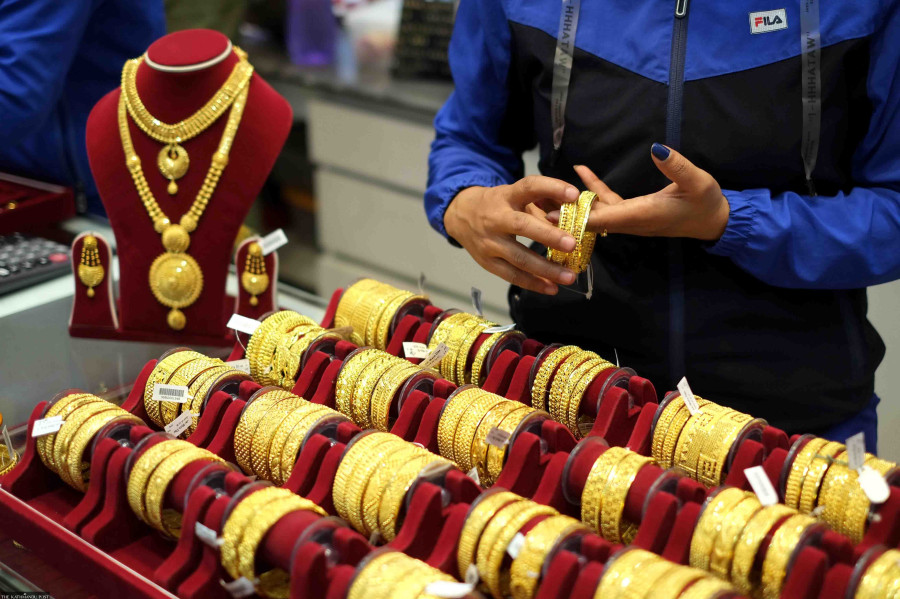Money
Gold surges to Rs113,300 after announcement of import duty
The government has slapped a 15 percent duty on the yellow metal in a bid to stem imports.
Krishana Prasain
Gold surged to a record high after the government slapped a 15 percent duty in a bid to stem imports.
The yellow metal traded at an all-time high of Rs113,300 per tola in the domestic market on Friday.
“A 15 percent customs duty will be levied on imported gold as per the Financial Bill,” said Punya Bikram Khadka, director at the Department of Customs.
Previously, customs duty was a flat Rs8,500 per 10 grams.
“As the international price of gold keeps fluctuating, from now onwards importers have to pay duty on the basis of their purchase bill,” Khadka said.
Immediately after the new provision went into effect, the price of gold jumped by Rs5,000 per tola.
Khadka said the tax on gold would fluctuate in line with international prices.
According to the Federation of Nepal Gold and Silver Dealers’ Association, gold cost around Rs108,000 per tola on Monday before the budget statement was published.
The price rose to Rs110,500 on Tuesday and hit a record Rs113,300 on Friday.
Manik Ratna Shakya, president of the association, said the price of gold increased because of the 15 percent customs duty.
But customs officials said that no new gold shipments had arrived in the market since the budget statement was issued.
“Bullion traders are selling their stock at a higher price under the pretext of a hike in the customs duty. Consumers are being cheated,” said the official.
Spot gold reached $1,977.31 per ounce in the international market on Friday, increasing by 1.6 percent in the week. The price is expected to go up to $1,980 per ounce next week, according to media reports.
The current gold market sentiment remains constructive, and prices could move a little higher. The price of gold has more room to rise and could go as high as $2,600 per ounce, as per international media reports.
On March 20, the price hit a 52-week high of $2,010 an ounce in the international market.
The Federation of Nepal Gold and Silver Dealers’ Association sets the daily gold price in line with international market prices which are the primary determinants of gold and silver prices.
“Following the sharp rise in the price, gold sales have slowed. The customs duty has made it more expensive,” said Shakya. “As the purchasing capacity of Nepalis has not increased, demand is subdued.”
Nepal imports most of its gold from Dubai, Turkey and Switzerland.
According to Nepal Rastra Bank, Nepal imported gold worth Rs42.69 billion in the last fiscal year 2021-22, up from Rs27.48 billion in the previous fiscal year.
Gold accounts for 2.2 percent of the country’s total import bill.
Shakya said that observing the international market, there are fewer chances of gold prices coming down. In fact, prices are likely to rise further, he said.
As the Financial Bill has levied a 2 percent "luxury tax" on goods and services considered to be luxurious items, prices of gold jewellery embedded with precious stones, ornaments, diamonds and pearls will also go up, traders said.
In the last three years, gold has become costlier by over Rs35,000 per tola.
The yellow metal cost Rs75,000 per tola before the Covid-19 pandemic.
On August 7, 2020, the price reached a high of Rs103,500, crossing the six-digit mark in the domestic market for the first time due to the Covid uncertainty. In 2021, the price dropped to Rs80,000 per tola.
Since March 6, a daily import quota of 10 kg set by Nepal Rastra Bank has been in force to save foreign exchange reserves. Previously, the quota was 20 kg daily.
The price of gold depends on international factors. Apart from global prices, which are denominated in dollars, import duties and other taxes also play a role in determining gold rates in Nepal.
If the Nepali currency weakens against the United States dollar, the price of gold will go up.
The price is also dependent on global economic growth, volatile policies and interest rates.
Gold is considered a safe investment tool in many countries and also acts as an excellent hedge against inflation. Globally, amid rising geopolitical tensions, people have turned to gold as a safe investment tool.
In Nepal, people purchase gold especially on two occasions—marriages and festivals like Teej, Dashain and Tihar. During the festivals, employees get bonuses and Hindus consider it auspicious to invest in gold on festive occasions.




 9.83°C Kathmandu
9.83°C Kathmandu















